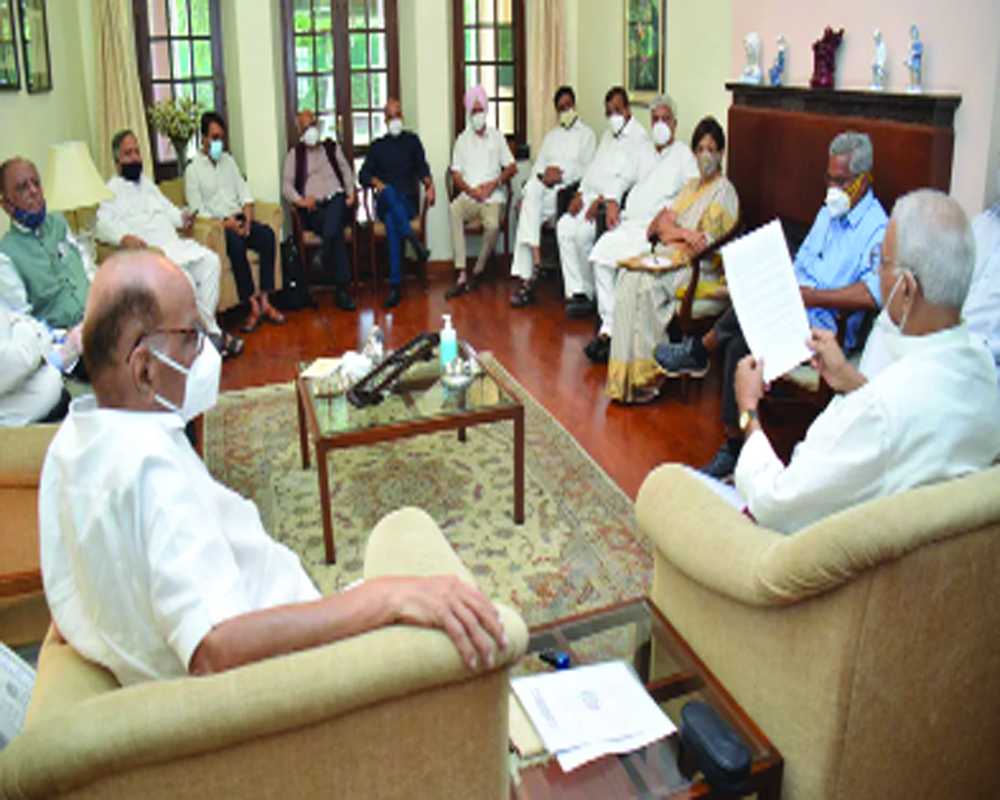Is it possible to have a collective leadership in a partnership where the regional satraps and the Congress both expect to head it?
The idea of an alternate front has emerged once again after the meeting held at the residence of Nationalist Congress Party chief Sharad Pawar recently. Why is the idea gaining ground even though there are three more years for the next elections? Some opposition leaders believe that non-BJP parties should join hands without waiting for Congress to take the initiative. Pawar was categorical that any new alliance will include Congress to fight the BJP, adding that such a coalition should have collective leadership.
The Congress is living in past glory. It is neither taking lead in uniting the opposition nor would join in any front with a supporting role. Moreover, Samajwadi Party, Bahujan Samaj Party, Aam Admi Party, Akali Dal, Telangana Congress Samithi, and Biju Janata Dal are opposed to the Congress. That is why Pawar now talks of collective leadership.
Historically, the idea surfaces whenever the national parties become weak and the regional parties aspire to rule the country by coming together.Secondly, having established their respective political fiefdoms, these regional satraps aspire for a more significant say in determining national priorities and policies.
Thirdly they also develop prime ministerial ambitions, having seen the elevation of H. D. Deve Gowda and I.K. Gujral in the past. However, the track record of such fronts shows they have produced weak prime ministers.
Fourthly, the national parties have begun to depend on regional parties in the states, riding piggyback on them. The conflicting egos and ambitions among the regional satraps and mutual mistrust make any front initiative incoherent. Even if Pawar realizes that an ideal coalition is an anti- BJP coalition, Congress included, is it possible to have a collective leadership in a partnership where the regional satraps and the Congress would expect to head such a coalition? Finding a consensus leader for such a strange alliance would be difficult. The alternate front without a face will be a flop show.
Moreover, getting 272 seats, the required majority in Lok Sabha, without either the BJP or Congress is unrealistic. The BJP won around 38 percent of the vote in 2019, and Congress, 20 percent. History also reveals that a third front government was never formed without the support of either of the two parties.
The first third-front government led by V.P. Singh was supported by the Left and the BJP in 1989. The front that emerged in 1996 was supported by Congress. The subsequent 24-partner NDA coalition was led by the BJP with Atal Behari Vajpayee as Prime Minister. The next government was of the UPA which was led by the Congress under Manmohan Singh. At present, the BJP under Narendra Modi leads the NDA government. Thus, at most, an alternative front to the BJP is the only possibility with Congress either leading or supporting it.
But it would be premature to speak of possibilities in 2024. Three years is a pretty long time in politics - and the BJP may well recover its lost political momentum. An old national party like Congress has the potential to revive itself too. Despite its electoral loss, Congress did get 11 crore votes in 2019 but is strong enough yet to take on the BJP on its own. Sharad Pawar can play the leading role in rallying anti-BJP parties together, leaving the contentious question of leadership to after the elections.
Facing a leadership crisis at the national level and indiscipline and factionalism in Congress-ruled states, the party has to pull up its socks. Its stature as a national party gives it two choices-- either join the new front or spoil the chances of the Pawar initiative by keeping away.
It is indeed a welcome move that the opposition has realised this and plans to come together much before 2024. Now that the goal is set, the means have to be found. It is a long and bumpy journey ahead. The opposition parties, Congress included, need to need to pool their resources, ideas, campaigns, and a new narrative to succeed. Mere Modi-bashing will not wash. The ball is in the court of Congress to support the new front or continue to live in its past glory. For that, it has to sort out its leadership crisis first. In a democracy, a strong government is as much a necessity as an effective opposition. In face of a divided opposition, the BJP has every chance of coming back in the next polls.
(The writer is a senior journalist. The views expressed are personal)


























